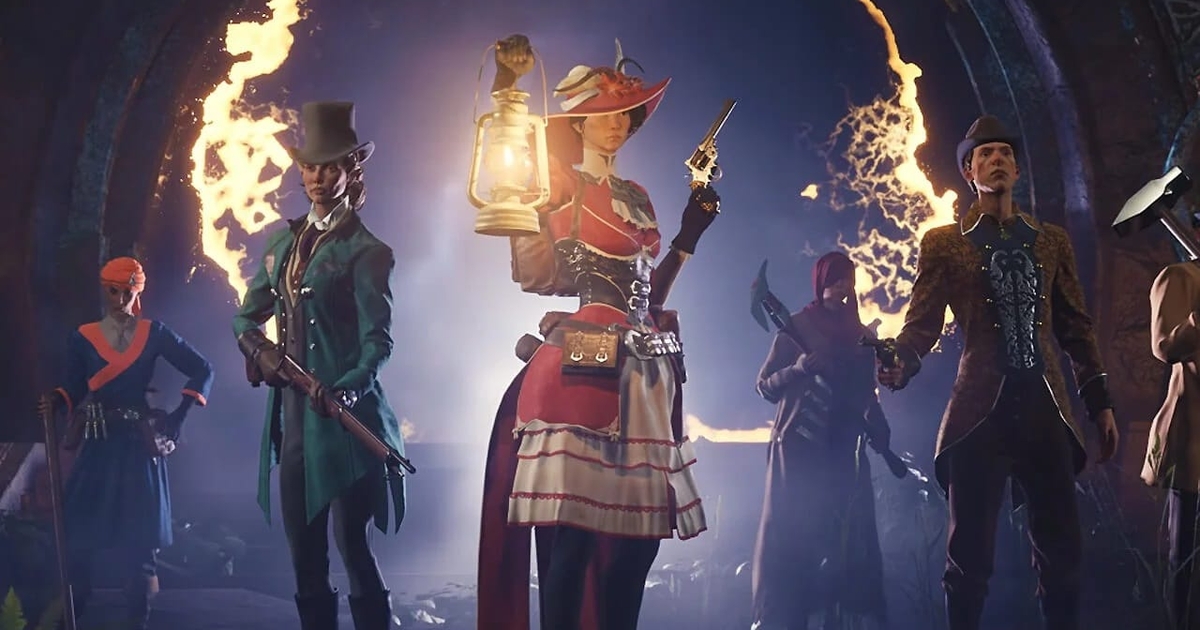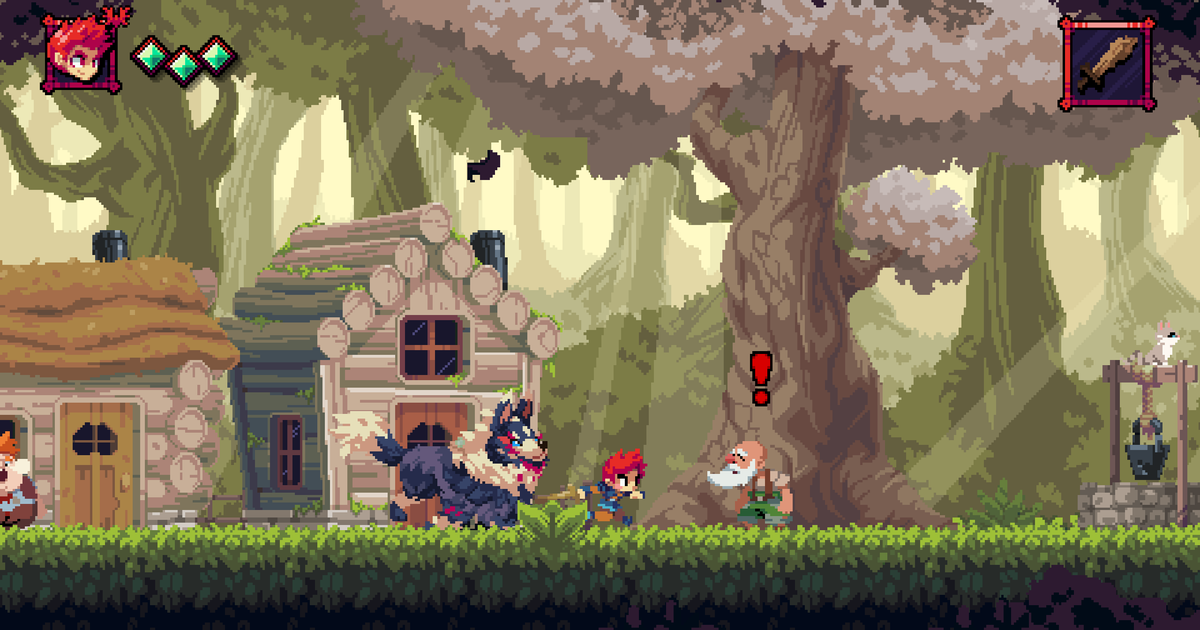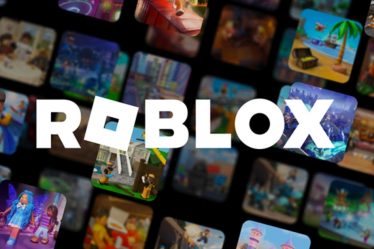
Editor’s note: This story was drafted before the Internet Archive suffered a massive DDOS attack, and links to archive.org currently do not function. Check back later to take your own deep dive in the Fat Babies archives.
Hello dear readers. Chris is out this month for some well-deserved R&R, leaving the pilot’s seat open for me to come in and steer the good ship Patch Notes. Today, we’re going to take a strange trip through game development history.
I was working on a completely unrelated story a couple weeks ago when a source I was speaking with casually asked me “you remember ‘Fat Babies,’ right?”
Fat Babies? The name was so outlandish I thought for a moment I was being played. But nope. I dug through The Internet Archive and discovered there was indeed a game developer’s gossip hub called Fat Babies, and it was incredibly unhinged.
How else could I describe it? Where in 2024 would you find a website where bloggers spilled industry gossip, developers argued viciously on forums, and the site hosts took regular swipes at Democrats? The site appears to have sprung up in late 1999, meaning Game Developer (née Gamasutra) was up and running by that point, but this was an entirely different beast. One part Perez Hilton, one part 4chan, one part job board, this was a site fully of its day and age.
“Our goal is to be the premier site for gaming gossip,” wrote anonymous contributor “FatSlicky,” whose real identity is still unknown to this day.
“We have a number of ‘insiders’ within the industry who are eagerly reporting back here with their gaming news—everything from slipped release schedules, cancelled projects, budget overruns, internal team conflicts, and key personnel hirings and firings.”
Tab over to the “musings” section of the site though and you’ll see why developers like Playable Worlds co-founder Raph Koster have “bad memories” of Fat Babies. He explained in an email to Game Developer that a site contributor put him in their crosshairs and reached out to his coworkers in search of “dirt,” later posting personal attacks about his character. “I got a pile of emails from coworkers saying ‘Fatbabies sucks, you’re not like that,’ he said highlighting that the site’s toxicity didn’t represent everyone in the video game business.
It’s not hard to dig up other vicious messages shared by the site’s operators—some elevated from the forums (which weren’t preserved by The Archive), giving us a snapshot of what some of the gossip looked like. The attacks on designers like Ion Storm level designer Stevie Case by contributor “FatMamaCita” feel particularly gross now that she’s told her story about the sexism that sent her out of the business.
Yet, for all the bile, Fat Babies was a rare source for developers to hear about the industry from other developers. “We didn’t have any way of keeping in touch—there were no subreddits, social media leaks, Linkedin, Blind, any places that insiders could talk or share info anonymously,” recalled former Wargaming and Sony Interactive Entertainment executive Scott Hartsman. “There was no such thing as ambient internet information yet.”
The “rumors” tab is filled with loads of single-sourced rumors, many of which didn’t age well. That’s because they either turned out to be not true or because they were tinged with drive-by racism. It’s also the tab that documented a spree of layoffs at companies like Sierra Online, Electronic Arts, Eidos, etc. There’s a good chance that was the only way for some developers to hear about that kind of news—and Hartsman said sometimes it was the only way you’d learn about goings-on at your own employer.
Imagine being a worker at Westwood given the chance to see your boss’s emails discussing why they’re releasing “junior or weaker members on the team.” Access to that kind of information would definitely make the toxicity bearable for some readers, wouldn’t it?
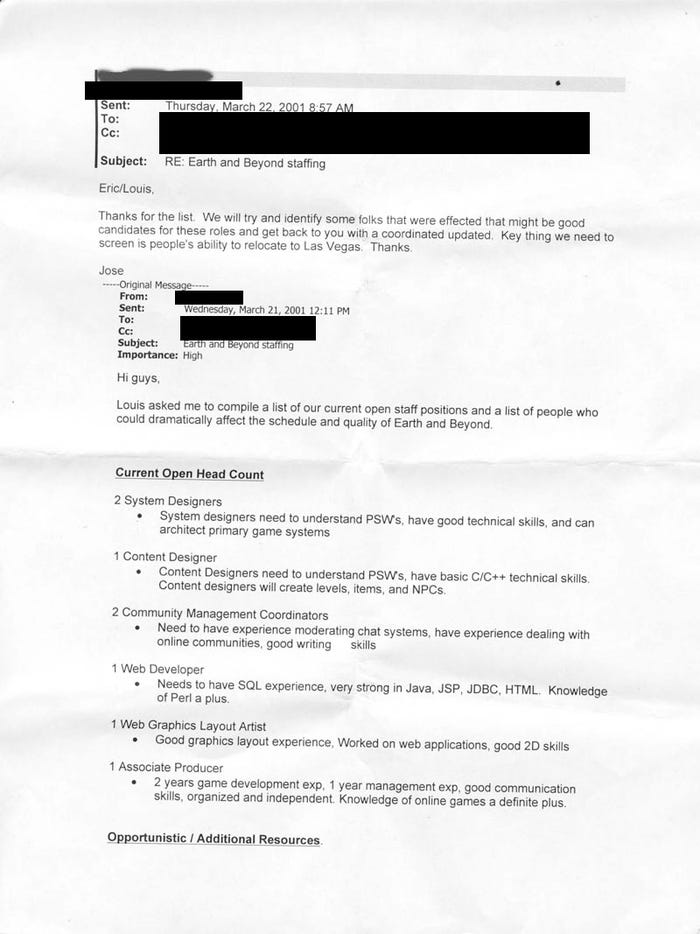
Image via Fat Babies. Names blacked out to protect identities.
Developers like Trevor Stricker of Pixel Disco told me they remember at first thinking Fat Babies was brilliant. “It felt like somebody else saw through the bullshit and publishing [the rumors] felt heroic.”
But he, like many we spoke with, became disillusioned by the personal attacks on developers. He recalled a piece targeting Visual Concepts founder Greg Thomas that made him see Fat Babies in a different light. “My opinion started to shift, like [the writer] was using his anonymity as a bully pulpit just to denigrate. he just hated on everyone and everything but…why? It was actually a fertile time for the industry. All this guy had to offer was bile.”
I admit to speedrunning through Thomas’ experience. When I first clicked through Fat Babies, my jaw hit the floor. Old gossip! Trashy blogs! Random asides about Iraq War protestors being paid by Democrats! Tragedy plus time equals comedy, and boy has there been enough time to find the comedy.
But as I dug the ruins of Fat Babies, I saw all the familiar toxic flaws of the game industry laid bare by those working in it. The low pay, the tales of crunch, the sexism, the racism, the homophobia…it’s easy to see what Case meant when she wrote to FatMamaCita “and people wonder why there aren’t more chicks in this industry.”
The game industry is now much more diverse, much more inclusive, and far more likely to push back against the attitudes you’d find on Fat Babies. Games journalism has become more robust, and our peers at Polygon, IGN, and GameSpot are now as capable of doing in-depth reporting as they are previews and reviews, reducing the need for dive bar gossip.
But progress isn’t linear. Minorities in the industry are still well…minorities, with gender and racial parity in pay and employment still a distant dream. Women and LGBTQ developers are still liable to face harassment in and out of the workplace, and companies like Star Citizen developer Cloud Imperium Games are reportedly making devs work 7 days a week. Developers spilling workplace gossip and chat logs to put coworkers in the path of an online horde is a phenomenon that’s still with us.
There’s plenty of time to lose all the progress we’ve gained. If we’re going to learn anything digging through the ruins of this once-well-trod website, it’s that this is a world we could easily return to.
Status Report: The headlines that matter
A big thanks to Tom Regan for stepping into our AM news slot while Chris heads abroad. He nabbed a number of notable stories this week that you should make sure to peruse.
-
Itch.io creator says site is prepared for possible retirement of .io domain// Itch.io creator Leaf Corcoran assured us the Itch team is “keeping an eye on” the possible retirement of the .io domain following the transfer of the Chagos Islands to Mauritius. I can’t help but wonder if using snappy domain names from other nations is its own kind of digital colonization, another example of how the West exploited a territory known for its self-sustaining abundance. The stakes are far lower, but we certainly should consider the needs of island residents and the global diaspora over our humdrum game marketing needs.
-
Firaxis strikes up partnership with Shawnee Tribe for ‘sincere representation’ in Civilization VII // Let’s all tip our caps to Firaxis for aiming to do better with including Native American tribes into Civilization. It’s a fine line to walk, as the Civilization series often embodies the expansion are values that led to the devastation of people like the Shawnee. But games about history are a fantastic way to introduce players to new historical figures and people, and omitting them entirely would be its own kind of erasure. I’m curious to see what the final results will be like.
Feature Creep: Originals and interviews for the discerning reader
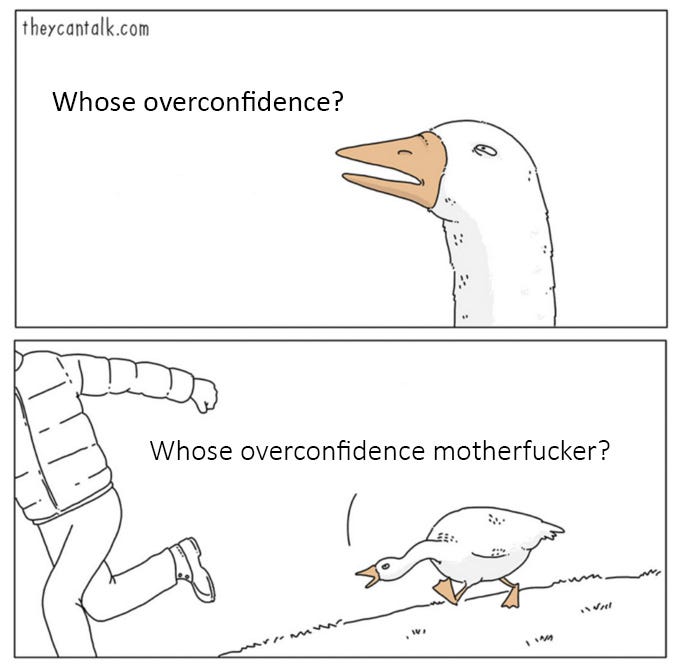
-
What Washington State is doing to juice local game development // So long as the United States Congress deadlocks itself into doing nothing thanks to the filibuster we will not get federal support for the video games industry over here. But allegedly that’s what the states are for! Washington State is leading the way here, with the Department of Commerce doing more to connect and build business opportunities for developers.
-
Why are so few games set in the Prohibition era? // I was very happy to edit Emma Withington’s piece here on prohibition-inspired games. It’s a surprisingly unexplored era! Probably because alcohol distribution jacks up PEGI and ESRB ratings…I was most compelled by Mark Schrad, PhD’s argument that the prohibitionists themselves make for colorful characters to follow, as they weren’t all strict moralists.

